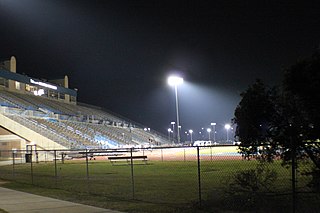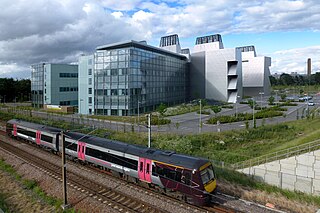
The United Kingdom Atomic Energy Authority is a UK government research organisation responsible for the development of nuclear fusion power. It is an executive non-departmental public body of the Department for Business, Energy and Industrial Strategy (BEIS).

Bicycle Network is an Australian charity, one of the largest cycling membership organisations in the world, whose mission is to have More People Cycling More Often. It was, prior to 2011, known as Bicycle Victoria.

Cycling in Melbourne, the capital city of Victoria, Australia, is enhanced by the city's relatively flat topography and generally mild climate. The city has an active cycling culture for commuting, recreation, fitness and sport, and the metropolitan area has an extensive network of off-road bicycle paths, as well as designated bicycle lanes on many streets.

Vehicular cycling is the practice of riding bicycles on roads in a manner that is in accordance with the principles for driving in traffic, and in a way that places responsibility for safety on the individual.

Bicycle safety is the use of road traffic safety practices to reduce risk associated with cycling. Risk can be defined as the number of incidents occurring for a given amount of cycling. Some of this subject matter is hotly debated: for example, the discussions as to whether bicycle helmets or cyclepaths really improve safety. The merits of obeying the rules of the road including the use of bicycle lighting at night are less controversial.
Charles Philip Newkey Burden is a British journalist and author. He has written 29 books, including one co-written with Julie Burchill. Three of the books have been official publications for Arsenal F.C.

Hodges Stadium is a multi-purpose stadium at the University of North Florida (UNF), and the home field for the North Florida Ospreys soccer, track and field, and cross country teams. It is located on the university's campus in Jacksonville, Florida, U.S. It is named for George and Kernan Hodges, who donated $2 million to upgrade the facility in 2006.

In its own right Jersey participates in the Commonwealth Games and in the bi-annual Island Games, which it last hosted in 2015. Jersey is a founder member of the Island Games Association and has participated in every Games since the first in 1985. Jersey first competed in 1958 in the British Empire and Commonwealth Games and has since participated in every staging of what became the Commonwealth Games. Youth sports participation includes the Commonwealth Youth Games and Jeux des Isles.

Cycling in London is a popular mode of transport and leisure activity within the capital city of the United Kingdom. Following a national decline in the 1960s of levels of utility cycling, cycling as a mode of everyday transport within London began a slow regrowth in the 1970s. This continued until the beginning of the 21st century, when levels began to increase significantly - during the period from 2000 to 2012, the number of daily journeys made by bicycle in Greater London doubled to 580,000. The growth in cycling can partly be attributed to the launch in 2010 by Transport for London (TfL) of the Santander Cycle Hire system throughout the city's centre. By 2013, the cycle hire scheme was attracting a monthly ridership of approximately 500,000, peaking at a million rides in July of that year. Health impact analyses have shown that London would benefit more from increased cycling and cycling infrastructure than other European cities.

MCKVIE is an engineering college founded in 1999, affiliated to West Bengal University of Technology. It ranks as one of the top engineering colleges in West Bengal and graded AA+ by Careers 360 (magazine) in 2015. The institute offers bachelor's and master's degrees in various engineering streams as well as a master's degree in computer applications. Students are admitted through West Bengal Joint Entrance Examination WBJEE, Joint Entrance Examination and Graduate Aptitude Test in Engineering.It has been selected for a TEQIP grant by the World Bank and also accredited by National Board of Accreditation. Also accredited by NAAC 'A' grade. The institute is located in Liluah, Howrah, West Bengal, India.

Cycling in Cardiff, capital of Wales, is facilitated by its easy gradients and large parks. In the mid-2000s between 2.7% and 4.3% of people commuted to work by cycling in the city. In 2017 12.4% of workers cycled to work at least 5 days a week. However, cyclists in the city are deterred from cycling by poor facilities and aggressive traffic, according to research by Cardiff University.

Cambridge is a university town and the administrative centre of the county of Cambridgeshire, England. It lies in East Anglia about 50 miles (80 km) north of London. Its main transport links are the M11 road to London, the A14 east–west road and the West Anglia Main Line railway line to London.

Cycling in Canada is experienced in various ways across a geographically huge, economically and socially diverse country. Among the reasons for cycling in Canada are for practical reasons such as commuting to work or school, for sports such as road racing, BMX, Mountain bike racing, freestyle BMX, as well as for pure recreation. The amount and quality of bicycle infrastructure varies widely across the country as do the laws pertaining to cyclists such as bicycle helmet laws which can differ by province.

Cycling infrastructure refers to all infrastructure permissible for use by cyclists, including the network of roads and streets used by motorists, except where cyclists are excluded, along with bikeways from which motor vehicles are excluded – including bike paths, bike lanes, cycle tracks, rail trails and, where permitted, sidewalks. Cycling infrastructure also includes amenities such as bike racks for parking, shelters, service centers and specialized traffic signs and signals. Cycling modal share is strongly associated with the size of local cycling infrastructure.

A shared bus lane is a bus lane that allows cyclists to use it. Depending on the width of the lane, the speeds and number of buses, and other local factors, the safety and popularity of this arrangement vary.
The history of cycling infrastructure starts from shortly after the bike boom of the 1880s when the first short stretches of dedicated bicycle infrastructure were built, through to the rise of the automobile from the mid-20th century onwards and the concomitant decline of cycling as a means of transport, to cycling's comeback from the 1970s onwards.

Safety of dedicated or segregated cycle facilities is controversial. Proponents say that segregation of cyclists from fast or frequent motorized traffic is necessary to provide a safe cycling environment. For example, a 2010 Montreal study found that cycle tracks were associated with fewer injuries when compared to comparable parallel roads with no cycling facilities.
One of the potential pitfalls for observers trying to interpret the operation of bikeways is that the same legal assumptions do not apply in all environments. For instance, in contrast to most English speaking countries, some European countries, including Germany, France, Denmark, Belgium, and the Netherlands have defined liability legislation. Thus there is a legal assumption that motorists are automatically considered liable in law for any injuries that occur if they collide with a cyclist. This may hold regardless of any fault on the part of the cyclist and may significantly affect the behaviour of motorists when they encounter cyclists.

Controversies have surrounded bikeways, particularly in North America and the United Kingdom and specifically between those who prefer to focus on education rather than separated cycling infrastructure and those who prefer to create dedicated facilities to make cyclists safer and make it more inviting to a wider public. Other dissenters say safety is better served by using the road space for parking.















